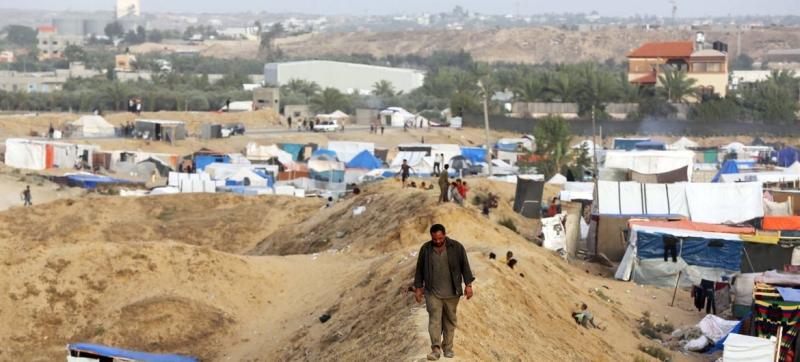
According to OCHA, “285 square kilometers, or approximately 78 percent of the Gaza Strip,” are currently under Israeli evacuation orders. Gaza’s humanitarian aid dwindling: UN chief reiterates calls to stop fighting in Rafah Peace and Security
UN chief Antonio Guterres on Thursday again warned against a full-scale offensive on Rafah, with humanitarian organizations calling for urgent safe travel routes across Gaza to replenish supplies of essential supplies. Meanwhile, the International Court of Justice is meeting to consider South Africa’s new request for further restrictions on Israeli military activities in the enclave.
Calling for the “immediate and unconditional release of all hostages” still held in Gaza, the Secretary-General told Arab League leaders at the Bahrain summit that nothing justified “collective punishment” of the Palestinians. “Any attack on Rafah is unacceptable: it will lead to a new wave of pain and suffering at a time when we need a wave of help to save lives,” he added.
Guterres also stressed that the UN Agency for Palestine Refugees (UNRWA) “remains the backbone of the organization’s operations in Gaza and the lifeline for Palestinian refugees throughout the region.” According to him, UNRWA needs support and funding.
Mass famine
Meanwhile, the World The UN Food Program (WFP) has issued a new warning of impending mass famine in the sector.
“Food and fuel supplies will run out within days,” WFP said on social media& ;nbsp;X. – Since May 6, we have not been able to access humanitarian aid from the Kerem Shalom checkpoint.”
The UN Program stressed the real threat that a further escalation of fighting in Gaza could lead to a “complete stop” of humanitarian operations and a humanitarian catastrophe.
WFP provides special nutrition for pregnant and lactating women and children under five years of age, but as of May 11 these anti-wasting programs were suspended in Rafah “and continue only in Khan Younis and Deir el-Balah on a limited basis.”
The WFP also warned that in the northern Gaza Strip, the rate of acute malnutrition among children under two years of age “doubled from 15 percent in January to 30 percent in March.” Humanitarian organizations warn that acute malnutrition is 3 to 12 times more likely to die than well-nourished children.
Evacuation Orders
UNRWA said late Wednesday that 600,000 people – a quarter of Gaza’s population – were forcibly displaced from Rafah last week amid ongoing fighting and evacuation orders. Another 100,000 people have been forced to flee their homes in the northern areas of the enclave.
Under the UN Office for the Coordination of Humanitarian Affairs (OCHA), Israeli evacuation orders are currently underway. are “285 square kilometers, or approximately 78 percent of the territory of the Gaza Strip.”
OCHA confirmed reports of heavy fighting in Jabaliya in the north, in Deir el-Balah in the central parts and in the eastern areas of Rafah in the south of the enclave.
As of May 15, the Rafah crossing remains closed. The Kerem Shalom crossing is operational, but prevailing security and logistics conditions are preventing large-scale deliveries of humanitarian aid, OCHA noted. aid and regular food supplies.
South Africa vs. Israel
The International Court of Justice on Thursday is due to consider a claim that South Africa applied on May 10 to end hostilities in and around Rafah.
“Urgent temporary measures are needed to ensure the survival of Palestinians in Gaza,” South Africa said in a statement .
According to the lawsuit, the Israeli attack on Rafah, which poses extraordinary risks to humanitarian supplies, medical services and “the very survival of Palestinians in Gaza,” also creates new conditions, “ which cause irreparable harm to the rights of the Palestinian people in Gaza.”
Last refuge
Rafah has become the “last refuge” for the enclave’s residents, South Africa’s petition says. Due to the Israeli military takeover of the Rafah crossing, as well as the temporary closure and ongoing problems with access to the nearby Kerem Shalom crossing, the main supply routes for vital humanitarian aid into Gaza are blocked, South African officials say.
The public and medical facilities are at extreme risk, given reports of evacuation zones being transformed into “kill zones,” as well as evidence of mass graves in hospitals and Israel’s use of artificial intelligence (AI) to identify “ hit lists,” according to court documents.
Read also:
The International Court of Justice ordered Israel to prevent acts of genocide in Gaza
At the end of January The UN’s top court has ordered provisional measures for Israel to prevent harm to Gaza residents after South Africa said Israel had breached its obligations as a signatory to the Genocide Convention. However, the court decision did not explicitly call for an immediate end to the full-scale military operation in the sector.
Israel has categorically denied all allegations and is due to respond to a new lawsuit from South Africa on Friday.
